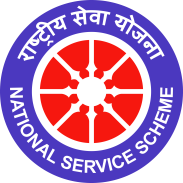NSS


Prof. Aishwarya Mane
NSS Coordinator

Prof. Prof. Sonali Hulmajage
NSS Officer

Prof. Ashwini Patil
NSS Officer
NSS
 PROFILE OF DEPARTMENT OF NSS
PROFILE OF DEPARTMENT OF NSS
MISSION
- To sensitize NSS volunteers about serving the nation through social services & Community Development.
- To Provide first-hand Experience to Youth & give them a sense of social responsibility.
- To Help in the Personality development of students by participation in various events, camps & activities
- Motivate NSS Volunteers for continuing their selfless service towards community work.
VISION
- Our sole aim is to develop Feelings of Social Help, National Unity, Harmony of Community & Patriotism among students via social services.
- Encourage them to contribute their share for the welfare of mankind.
- Provide a chance to develop the overall personality of the student volunteers.
- Motivate NSS Volunteers for continuing their selfless service towards community work.
OBJECTIVES OF NSS
The main objectives of National Service Scheme (NSS) are:
- Understand the community in which they work
- Understand themselves in relation to their community
- Identify the needs and problems of the community and involve them in problem-solving
- Develop among themselves a sense of social and civic responsibility
- Utilise their knowledge in finding practical solutions to individual and community problems
- Develop competence required for group-living and sharing of responsibilities
- Gain skills in mobilising community participation
- Acquire leadership qualities and democratic attitudes
- Develop capacity to meet emergencies and natural disasters
- Practise national integration and social harmony
MOTTO OF NSS:
The Motto of NSS “Not Me But You”, reflects the essence of democratic living and upholds the need for self-less service. NSS helps the students develop an appreciation of other people’s points of view and also show consideration to other living beings. The philosophy of the NSS is well doctrine in this motto, which underlines/on the belief that the welfare of an individual is ultimately dependent on the welfare of the society on the whole, and therefore, the NSS volunteers shall strive for the well-being of the society.
PLANNED ACTIVITIES
The special camping program will focus on the sub-theme of “Youth for Better Environment.” Activities under this sub-theme will include:
- Planting and protecting at least 1000 saplings per NSS unit.
- Creating NSS parks/gardens.
- Constructing and maintaining village streets, drains, etc., to ensure a clean environment.
- Building sanitary latrines and promoting their use.
- Cleaning village ponds and wells.
- Promoting and constructing Gobar Gas Plants and encouraging the use of non-conventional energy.
- Ensuring environmental sanitation, proper garbage disposal, and composting.
- Preventing soil erosion and working on soil conservation.
- Implementing watershed management and wasteland development initiatives.
Activities in this area will focus on improving health, family welfare, and nutrition. Some of the activities include:
- Organizing mass immunization programs.
- Collaborating with Home Science and medical college students for nutrition programs.
- Providing safe and clean drinking water.
- Participating in integrated child development programs.
- Conducting health education campaigns, AIDS awareness programs, and preliminary health care initiatives.
- Promoting population education and family welfare programs.
- Establishing lifestyle education centers and counseling centers.
Activities under this program will aim to raise awareness about women’s rights and empowerment. Some of the activities include:
- Educating people about women’s rights, both constitutional and legal.
- Creating awareness among women about their contributions to the community’s economic and social well-being.
- Encouraging women to pursue any occupation or vocation by acquiring the necessary skills.
- Providing training to women in sewing, embroidery, knitting, and other relevant skills.
- Promoting the Beti Bachao Beti Padhao (Save the Girl Child, Educate the Girl Child) initiative.
Based on local needs and priorities, the following activities/programs may be undertaken:
- Assisting in hospitals by visiting patients, organizing activities, and providing guidance to out-patients and visitors.
- Working with organizations focused on child welfare.
- Collaborating with institutions for the physically and mentally handicapped.
- Organizing blood donation and eye pledge programs.
- Supporting Cheshire homes, orphanages, homes for the aged, and other welfare organizations.
- Conducting social education programs to prevent slums and promote community action.
Activities under this program will focus on promoting improved agricultural practices and supporting rural development. Some of the activities include:
- Working with farmers to teach and explain improved agricultural practices.
- Implementing rodent and pest control measures.
- Conducting weed control activities.
- Providing soil testing, soil health care, and soil conservation guidance.
- Assisting in the repair of agricultural machinery.
- Promoting and strengthening cooperative societies in villages.
- Providing assistance and guidance in poultry farming, animal husbandry, and animal health care.
- Assisting in procuring bank loans for agricultural activities.
This program aims to assist and support people affected by natural calamities. Activities under this program include:
- Assisting in the distribution of rations, medicine, clothes, etc.
- Supporting health authorities in immunization, medical supplies, etc.
- Working with local communities to reconstruct huts, clean wells, and build roads.
- Assisting local authorities in relief and rescue operations.
- Collecting clothes and other materials for sending them to affected areas.
Activities under this program focus on educational and recreational initiatives. Some of the activities include:
- Conducting adult education programs.
- Organizing pre-school education programs.
- Providing continuing education and remedial coaching for school dropouts and students from weaker sections.
- Arranging cultural and recreational programs for the community, including the use of mass media.
- Holding discussions on eradicating social evils like communalism, casteism, regionalism, untouchability, and drug abuse.
- Providing non-formal education for rural youth.
- Promoting legal literacy and consumer awareness.
- Supporting the Swachh Bharat Mission (Clean India Mission), digital awareness, and voter awareness initiatives.
The above list provides examples of activities that can be undertaken. Each NSS Unit can choose one of these programs or any other activity that is suitable according to local needs. The aim is to promote the integrated development of the selected area, whether it is a village or a slum.
